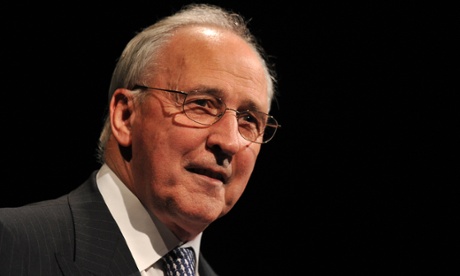ONLY THE LABOR PARTY CARES FOR ALL AUSTRALIANS
Paul Keating calls for longevity levy to supplement superannuation
Former PM says 2% or 3% of wages could go to a national insurance scheme to guarantee people over 80 income and care

Paul Keating says Australia needs a new government insurance scheme
for people aged over 80, which would guarantee elderly people income
support, aged care and aged accommodation for the remainder of their
lives.
The former prime minister told the ABC’s Lateline
program the insurance scheme was necessary because superannuation
savings were insufficient to sustain people living well into their 90s.
The growing cohort of people aged between 80 and 100 required a new
phase of policy thinking about retirement incomes.
He said a national insurance scheme should be funded by taxpayers through a “longevity levy of a kind – 2 or 3% of wages”.
Keating,
who crafted the superannuation system, argued its adequacy needed to be
addressed, and that meant super guarantee contributions needed to
increase from 9% to 12% quickly. The government also had to move more
people off dependence on the aged pension.
But he said inexorable
demographic change required more than just these measures, it required
something more fundamental – it required “superannuation mark two”.
“For
people on an ordinary income all their lives – having 80, 100, 120 or
$200,000 or more in a lump sum gives them that little bit of comfort in
retirement that there’s something to rely on, something to get them out
of trouble if they get really sick, support their kids if they have to –
all the things that they do,” Keating told the ABC.
“But we can’t
try and pretend that like a piece of Indian rubber – we can stretch the
accumulation from [age] 65 to 95,” he said.
“There’s not enough
of it now, and it can't go for 30 years, so we have to have, I believe, a
commonwealth insurance scheme for the 80 to 100s with a calibrated
precise product which guarantees people income support, aged care and
aged accommodation.”
“It's a classic model for an insurance
scheme, but it's got to be done in the 80 to 100 cohort while we
continue to build [superannuation] accumulations between 60 and 80.”
Keating
said it needed to be a government scheme because “no commercial insurer
can insure across generations and no insurer can pool this like the
commonwealth”.
He was dismissive of concerns from welfare groups
that tax concessions for superannuation are too generous, entrenching
inequities. When you look across a range of measures – “transfer
payments, family assistance, support for kids at school and the rest,
we've got a much more even society in Australia than say the United
States, than Great Britain or any of these countries – so these sort of
mealy-mouthed claims by the welfare lobby about superannuation are
fundamentally false”.
Keating also gave the Treasury a belt for
being antagonistic “to every tax expenditure that exists including
superannuation. The Treasury is a great department but has not a
scintilla of imagination.”
He contended if there weren’t generous
concessions for super, people would chase concessions elsewhere: “They
would negatively gear a house, buy shares in Westpac or BHP or the
Commonwealth Bank and doing tax-preferred thing.”
He said Treasury
had massively overestimated and overinflated the cost of superannuation
in terms of forgone revenue because of its philosophical antagonism
towards the tax concessions. “I mean, look, if I was still around I
would have massacred them for this,” he said. “Massacred them.”
Of the budget task ahead for the Coalition, Keating said the government should focus on delivering structural reform.
“One
of the first things Bob Hawke and I did in 1984 was to put an assets
test on the pension to sit beside the income test. In those days the
pension was only income-tested, you could have a house worth $3m or 5m
and you still got a full pension, so we put an assets test,” he said.
“It's
those kind of structural changes which produce a medium-term change in
the budget trajectory and that's what is needed now – that is, we're not
going to remedy this in 12 months, we're going to remedy it over time.”
He
said governments should focus on structural reform which induced
behavioural change “to change the spending side of the budget” and then
rely on economic growth to boost revenue collection while the government
reduced outlays.
Keating was cool on notions such as extending the GST.
“You can't build a society where the low- to middle-income people carry the greater burden of the tax system,” he said.

No comments:
Post a Comment